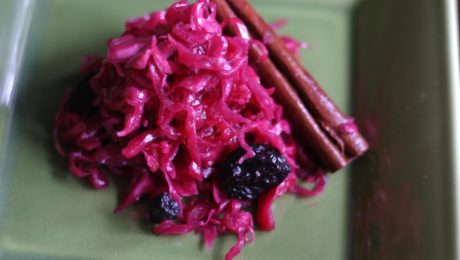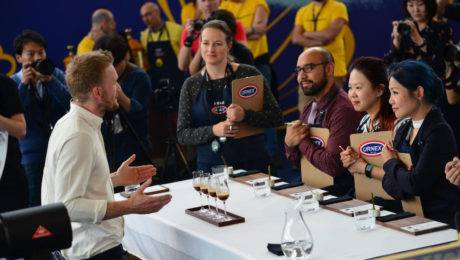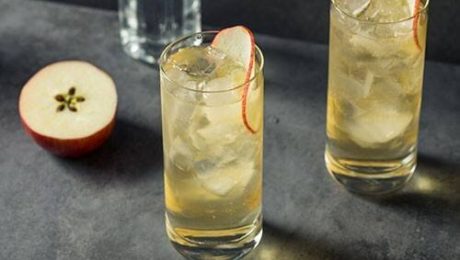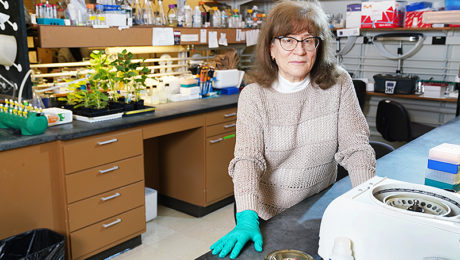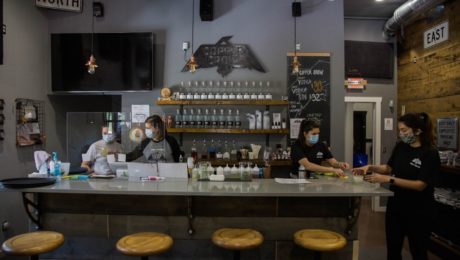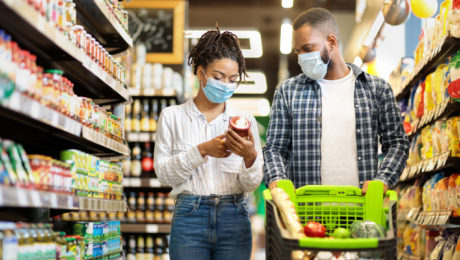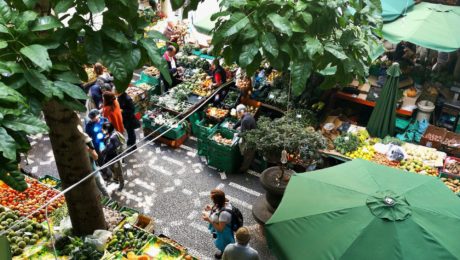Jewish Delis GoVegan
Jewish delis are evolving for modern consumers, offering plant-based alternatives to lox and pastrami.
“We’re literally saving the Jewish deli. We’re giving it the modern twist that’s desperately needed to stay delicious and relevant to a growing segment of the population,” said Jenny Goldfarb, the founder and CEO of Unreal Deli. Goldfarb’s plant-based corned-beef-pastrami hybrid attracted an investment deal on SharkTank, and today it’s available in 2,200 grocery stores.
Though Jewish cuisine is known for being heavy on meat, vegetarian food has a part in Ashkenazi culture, notes Jeremy Umansky, chef at Larder Deli in Cleveland. He points out that kashruth (kosher dietary laws) and periods of poverty meant Jewish cuisine always included vegetarian recipes.
The food at Larder — which includes vegan and vegetarian dishes — is put through the same process as animal-based items. Umansky cures mushrooms with salt and koji for a smoky, savory flavor and meat-like texture.
“It’s all about the method and technique behind the production of those foods,” Umansky said. “You know, going back and looking at things and seeing that there is historical precedent for this.” Pictured, a selection of vegan Jewish deli fare at Ben & Esther’s in Portland, Oregon.
Read more (Insider)
- Published in Business, Food & Flavor
KojiCon Highlights
Over 1,100 koji experts and enthusiasts from 63 different countries and 49 states gathered virtually for this year’s KojiCon. Koji, the mold-based ferment prevalent in East Asia and used to make soy sauce, sake and miso, is becoming more common in restaurants and in home cooking around the world.
The second annual KojiCon wrapped-up March 6. It was created by the Yellow Farmhouse Education Center, a nonprofit organization based at Stone Acres Farm in Stonington, Connecticut. The center focuses on food and farm education through educational opportunities. Rich Shih, co-author of Koji Alchemy, who helps organize the event, joined speakers like Sandor Katz, Misti Norris, Takashi Sato, Hiroko Shimbo, Kirsten Shockey, Jeremy Umansky and David Zilber and Mara King speaking on the theme of “Changing Food for Good.”
“It opens our eyes to possibilities beyond koji, within the Asian approach towards fermentation, primarily mold-based,” Shih said of the conference. “We want you to discover that, through fermentation, maybe just adding a little bit of salt or drying it or you know of course adding these mold-based ferments that we’re talking about, you can create amazing flavors.”
Pictured are Jen Rothman and Eric Dawson of Yellow Farmhouse, Shih, Irene Yoo of Yoo Eating, King and Umansky.
Though the conference is over, tickets to watch the recordings are still available at: https://kojicon.org/
- Published in Food & Flavor
“Bacterial Bully” Could Create Healthier & Tastier Fermented Foods
Microbiologists have long considered that there are two distinct categories of energy conservation in microorganisms: fermentation and respiration. Lactic acid bacteria (LAB) use fermentation, making it central to food and drink production and preservation since the dawn of man.
But researchers at the University of California, Davis, and Rice University discovered a LAB species that uses a hybrid metabolism, combining both fermentation and respiration.
“These are two very different things, to the extent that we classify bacteria as basically one or the other,” said Caroline Ajo-Franklin, a bioscientist at Rice University and co-author of the study. “There are examples of bacteria that can do both, but that’s like saying I can ride a bicycle or I can drive a car. You never do both at the same time.”
“What we discovered is a LAB that blends the two, like an organism that’s not warm- or cold-blooded but has features of both,” she said. “That’s the big surprise, because we didn’t know it was possible for an organism to blend these two distinct metabolisms.”
The species — lactiplantibacillus plantarum — is what scientists call a bacterial bully because it takes advantage of two distinct metabolic processes, according to a press release from Rice on the study. These systems were “not previously known to coexist to acquire the fuel they burn for energy.”
“Using this blended metabolism, lactic acid bacteria like L. plantarum grow better and do a faster job acidifying its environment,” said Maria Marco, a professor in the food science and technology department at UC Davis and the study’s co-author [and a TFA Science Advisor].
The discovery is significant for food and chemical production. New technologies that use LAB could now produce healthier and tastier ferments, minimize food waste and change the flavors and textures of fermented food.
“We may also find that this blended metabolism has benefits in other habitats, such as the digestive tract,” Marco said. “The ability to manipulate it could improve gut health.”
The study began with a puzzle: the realization that genes responsible for the electron transfer pathway in mainly respiratory organisms also appear in the LAB genome. “It was like finding the metabolic genes for a snake in a whale,” Ajo-Franklin said. “It didn’t make a lot of sense, and we thought, ‘We’ve got to figure this out.’”
While the Davis lab studied the genome, the team at Rice carried out fermentation experiments on kale.
“It wasn’t our first choice,” said Rice alumna and co-lead author Sara Tejedor-Sanz (now a senior scientific engineer in the Advanced Biofuels and Bioproducts Process Development Unit at Lawrence Berkeley National Lab).
“We performed some initial experiments with cabbage, since that’s a known fermented food — sauerkraut and kimchi — in which lactic acid bacteria are present,” she said. “But there were technical difficulties and it didn’t turn out so well. So we looked for another food to ferment where LAB could be found in its ecological niches.
“Kale has compounds like vitamins and quinones that lactic acid bacteria use as cofactors in their metabolism, and are also involved in interacting with the electrodes,” she said. “We also found fermenting kale to make juice was a trend. It sounded perfect for our biochemical reactors.”
The study showed LAB enhances metabolism through a FLavin-based Extracellular Electron Transfer (FLEET) pathway that expresses two genes (ndh-2 and pp1A) associated with iron reduction, a step in the process of stripping and incorporating electrons into ATP (adenosine triphosphate (ATP), energy-carrying molecule).
Because LAB’s genome has evolved to be small, thus requiring less energy to maintain, the wide conservation of FLEET must serve a purpose, Ajo-Franklin said.
“Our hypothesis is this helps bacteria get established in new environments,” she said. “It’s a way to kick-start their metabolisms and outcompete their neighbors by changing the environment to be more acidic. It’s being a bully.”
That the FLEET pathway can be triggered with electrodes offers many possibilities, she said. “We found we can use the hybrid metabolism in food fermentation,” Ajo-Franklin said. “Now we have a way to change how food may taste and avoid failed food fermentations by using electronics.”
“We may also find that this blended metabolism has benefits in other habitats, such as the digestive tract,” Marco said. “The ability to manipulate it could improve gut health.”
Ajo-Franklin noted LAB are commonly found in the microbiomes of many organisms, including humans. “You can already buy it in health food stores as a probiotic,” she said. “The human gut is an anaerobic environment, so LAB have to keep a redox balance. If it oxidizes carbon to gain energy, it has to figure out a way to reduce carbon somewhere else.
“Now we think if we provide another electron donor or acceptor, we could promote the growth of positive bacteria over negative bacteria.”
UC Davis graduate student Eric Stevens is co-lead author of the study. Co-authors are Rice graduate student Siliang Li; at UC Davis, graduate students Peter Finnegan and James Nelson, and Andre Knoesen, a professor of electrical and computer engineering, at UC Davis; and Samuel Light, the Neubauer Family Assistant Professor of Microbiology at the University of Chicago.
Ajo-Franklin is a professor of biosciences and a CPRIT Scholar. Marco is a professor of food science and technology.
The National Science Foundation, Office of Naval Research, the Department of Energy Office of Basic Energy Sciences and a Rodgers University fellowship supported the research.
The study results were published in the journal eLife.
- Published in Food & Flavor, Health, Science
Changing Face of Specialty Coffee
Gesha (or Geisha) coffee has been the favored variety in coffee competitions for over 15 years. But recently specialty coffee brewers are using a new variety: the species C. eugenioides. An article in Perfect Daily Grind details the shift.
As Gesha became the preferred choice of coffee champions (seven of the World Brewers Cup (WBrC) champions from 2011 to 2019 used Gesha), the price started to rise. Gesha production, common in Panama, began to increase in other countries wanting to farm the popular variety, notably Colombia and Ethiopia. But increased production led to some lower-quality Geshas coming to market.
In recent years, producers have opted for lesser-known coffees, notably eugenioides, a species of arabica originating in East Africa. Its flavor profile is unique, with notes of tropical fruit, and has lower levels of caffeine. But it can be a risky variety. Eugenioides trees are small and produce small cherries, and they take years to grow.
A possibly more sustainable option for the industry: innovative processing techniques. The 2015 WBrC winner won using carbonic maceration process, a fermentation technique used in the wine industry.
“Fermentation is an effective way to influence the aroma and taste of coffee. It changes the acidity levels and body of coffee,” explains Chad Wang, founder of VWI by Chad Wang, a specialty coffee judge and the 2017 WBrC winner. “Fermentation can significantly help coffee farms to offer different tastes without having to change too much.”
[To learn more about fermentation in coffee, check out TFA’s webinar with the Specialty Coffee Association “The State of the Art in Coffee Fermentation.” The two organizations will be partnering again for a Spanish language version of the free webinar on March 3.]Read more (Perfect Daily Grind)
- Published in Food & Flavor
Tastier Apple Spirits
Thanks to their high sugar content and strong flavor, apples have been a great base for spirits like cider, calvados and applejack for hundreds of years. But “many decisions about their processing are still subjectively determined.” When to stop distillation for the most flavorful liquor, for example, is open to question. But new research has identified the best conditions for making apple-based spirits with the most desirable qualities and taste.
Researchers with the American Chemical Society fermented apples into a mash, then distilled it in a German-style batch column. Heat concentrates the alcohol and “removes unpleasant fermentation byproducts, such as carboxylic acids that can impart unclean, rancid, cheesy and sweaty flavors.” The researcher’s mash was continuously monitored during heating, and the levels of the nine carboxylic acids measured.
Heating the mash too quickly yielded unwanted flavor compounds and a bland aroma. But raising the temperature of the cooling tower slightly produced a good fragrance intensity, and reduced carboxylic acid levels.
Read more (American Chemical Society)
- Published in Food & Flavor, Science
Yogurt Alters Gut Microbiome
It’s widely appreciated that consuming high-quality yogurt can aid a healthy diet. Now new research shows eating yogurt changes the composition of the human gut microbiome.
In a new human study published in BMC Microbiology, researchers studied the microbiome of European twins. Results found those regularly eating yogurt had less visceral fat mass, reduced insulin levels and an increase of bacterial species in the gut. Strains S. thermophilus, B. animalis subsp. lactis., S. thermophilus and B. animalis subsp. lactis were all present in yogurt eaters.
The study also found the yogurt bacteria are “transient members of the gut microbiome and do not durably engraft within the gut lumen.”
Read more (BMC Microbiology)
Fermentation Key to Mass Producing Anti-Cancer Compounds
Thyme and oregano possess an anti-cancer compound that suppresses tumor development, but adding more to your tomato sauce isn’t enough to gain significant benefit. The key to unlocking the power of these plants is in amplifying the amount of the compound created or synthesizing the compound for drug development.
And exciting for the field of fermentation: extracting those beneficial compounds from the plant is done through fermentation.
“The fermentation process is so important to food and beverage, pharmaceutical and biofuels production that Purdue now offers a fermentation science major,” reads a press release from Purdue University.
Researchers at Purdue took the first step in using the compound in pharmaceuticals by mapping its biosynthetic pathway, a sort of molecular recipe of the ingredients and steps needed.
“These plants contain important compounds, but the amount is very low and extraction won’t be enough,” said Natalia Dudareva, distinguished professor of biochemistry in Purdue’s College of Agriculture and director of Purdue’s Center for Plant Biology, who co-led the project. “By understanding how these compounds are formed, we open a path to engineering plants with higher levels of them or to synthesizing the compounds in microorganisms for medical use. “It is an amazing time for plant science right now. We have tools that are faster, cheaper and provide much more insight. It is like looking inside the cell; it is almost unbelievable.”
Thymol, carvacrol and thymohydroquinone are flavor compounds in thyme, oregano and other plants in the Lamiaceae family. They have antibacterial, anti-inflammatory, antioxidant and other properties beneficial to human health. Thymohydroquinone has been shown to have anti-cancer properties and is particularly of interest, said Dudareva..
In collaboration with scientists from Martin Luther University Halle-Wittenberg in Germany and Michigan State University, the Purdue team uncovered the entire biosynthetic pathway to thymohydroquinone, including the formation of its precursors thymol and carvacrol, and the short-lived intermediate compounds along the way.
The findings alter previous views of the formation of this class of compounds, called phenolic or aromatic monoterpenes, for which only a few biosynthetic pathways have been discovered in other plants, she said. The study results were published in the Proceedings of the National Academy of Sciences.
“These findings provide new targets for engineering high-value compounds in plants and other organisms,” said Pan Liao, co-first author of the paper and a postdoctoral researcher in Dudareva’s lab. “Not only do many plants contain medicinal properties, but the compounds within them are used as food additives and for perfumes, cosmetics and other products.”
Now that this pathway is known, plant scientists could develop cultivars that produce more of the beneficial compounds, or it could be incorporated — using fermentation — into microorganisms like yeast for production.
A $5 million grant from the National Science Foundation supported the research. Using RNA sequencing and correlation analysis, the team screened more than 80,000 genes from plant tissue samples and identified the genes needed for thymohydroquinone production. Based on what was known about the compound structure and through metabolite profiling and biochemical testing, the team identified the biosynthetic pathway.
“The intermediate formed in the pathway was not what had been predicted,” Liao said. “We found that the aromatic backbone of both thymol and carvacrol is formed from γ-terpinene by a P450 monooxygenase in combination with a dehydrogenase via two unstable intermediates, but not p-cymene, as was proposed.”
More pathways are now being discovered, thanks to the availability of RNA sequencing to perform high-throughput gene expression analysis, according to Dudareva.
“We, as scientists, are always comparing pathways in different systems and plants,” Dudareva said. “We are always in pursuit of new possibilities. The more we learn, the more we are able to recognize the similarities and differences that could be key to the next breakthrough.”
- Published in Science
Whey-Based Spirits
Wisconsin-based Native American distillery Copper Crow is using whey to make vodka and gin. Whey (the liquid byproduct of cheesemaking) gives the liquors a creamy, sweet, sake-like taste.Copper Crow one of only a handful of distilleries in the world that makes whey-based spirits.
Whey can be difficult to dispose of. Every pound of cheese leaves behind nine pounds of whey, but it cannot be poured down a drain or into farm fields because it consumes oxygen. Many cheesemakers use it for animal feed or fertilizer.
“The market for the protein-rich, lactose-clouded liquid is minuscule — mostly makers of workout snacks and wellness tonics — but distillers represent a small yet emerging new customer base, with American producers beginning to follow the lead of those in the U.K., France, Australia, and New Zealand,” reads an article on Copper Crow in Fortune.
Copper Crow sits on the Red Cliff Reservation, with Lake Superior artesian aquifers providing pristine water. Owners Curtis and Linda Basina are members of the Red Cliff Band of the Lake Superior Chippewa. Prohibition laws from 1834, though, barred Native Americans from trading alcohol on their reservations.So it would be illegal to run a distillery on their reservation.
The Bassinas found a loophole to the racially-motivated ban — they own title to the land where the distillery is located. Their application was approved, “a watershed moment for Native American entrepreneurs long denied a slice of a booming craft-distilling industry.”
Read more (Fortune)
- Published in Business, Food & Flavor
“Our Customers Do Not Even Know What is a Fermented Item”
Fermentation is cloaked in mystery for many — it’s bubbly, slimy, stinky and not always Instagram-ready. In The Fermentation Association’s recent member survey, this lack of
understanding of fermentation and its flavor and health attributes among consumers was cited by 70% of producers as a major obstacle to increased sales and acceptance of fermented products.
“We get so many questions from our readers about fermentation. People are very interested, but have very, very little knowledge about it,” says Anahad O’Connor, reporter for The New York Times. O’Connor has written about fermented foods multiple times in the last few months, and those articles were among The Times’ most emailed pieces of 2021. “I think there’s a huge opportunity to educate consumers about fermented foods, their impact on the gut and health in general.”
O’Connor spoke on consumer education as part of a panel of experts during TFA’s conference, FERMENTATION 2021. Panelists — who included a producer, retailer, scientist, educator and journalist — agreed consumer education is lacking. But the methods of how to fill that gap are contested.
How to Tell Consumers “What is a Fermented Food?”
There are differences between what is a fermented product and what is not — a salt brine vs. vinegar brine pickle, or a kombucha made with a SCOBY or one from a juice concentrate, for example.
“I can tell you that the majority of our customers do not even know [what is a] fermented item,” says Emilio Mignucci, vice president of Philadelphia gourmet store Di Bruno Bros., which specializes in cheese and charcuterie. When customers sample products at the store, they can easily taste the differences between a fermented and a non-fermented product, Mignucci says. But he feels the health benefits behind that fermented product are not the retailer’s responsibility to communicate. “I need you guys [producers] to help me deliver the message.”
“Retailers like myself, buyers, we want to learn more to be able to champion [fermented foods] because, let’s face it, fermented foods is a category that’s getting better and better for us as retailers and we want to speak like subject matter experts and help our guests understand.”
Now — when fermentation tops food lists and gut health is mainstream — is the time for education.
“This microbiome world that we’re in right now is sort of a really opportune moment to really help the public understand what fermented foods are beyond health,” says Maria Marco, PhD, professor of food science at the University of California, Davis (and a TFA Advisory Board Member).
Kombucha Brewers International (KBI) created a Code of Practice to address confusion over what is or is not a kombucha. KBI is taking the approach that all kombucha is good, pasteurized or not, because it’s moving consumers away from sugar- and additive-filled sodas and energy drinks.
“That said, consumers deserve the right to know why is this kombucha at room temperature and this kombucha is in the fridge and why does this kombucha have a weird, gooey SCOBY in it and this one is completely clear,” says Hannah Crum, president of KBI. “They start to get confused when everything just says the word ‘kombucha’ on it.”
KBI encourages brewers to be transparent with consumers. Put on the label how the kombucha is made, then let consumers decide what brand they want to buy.
Should Fermented Products Make Health Claims?
Drew Anderson, co-founder and CEO of producer Cleveland Kitchen (and also on TFA’s Advisory Board), says when they were first designing their packaging in 2013, they were advised against using the term “crafted fermentation” on their label because it would remind consumers of beer or wine. But nowadays, data shows 50% of consumers associate the term fermentation with health.
“In the last five to six years, it’s changed dramatically and people are associating fermentation as being good for them, which is good for my products,” he says.
Cleveland Kitchen, though, does not make health claims on their fermented sauerkraut, kimchi and dressings. Anderson says, as a small startup, they don’t have the resources to fund their own research. They instead attract customers with bold taste and striking packaging.
“We’re extremely cautious on what we say on the package because we don’t have an army of lawyers like Kevita (Pepsi’s Kombucha brand), we don’t have the Pepsi legal team backing us here,” Anderson says. Cleveland Kitchen submits new packaging designs in advance to regulators, to make sure they’re legally acceptable before rolling them out.
O’Connor says taste is the No. 1 driver for consumers. This is why healthful but sticky and stinky natto (fermented soybeans) is not a popular dish in America, but widely consumed in Japan.
“Many American consumers, unfortunately, aren’t going to gravitate toward that, despite the health benefits,” he says.
Crum disagrees. “Health comes first,” she says. As more and more kombucha brands emphasize lifestyle, and don’t even advertise their health benefits, she feels they are doing a disservice to the consumer. “Why pay that much money for kombucha if you don’t know it’s good for you too?”
- Published in Business, Food & Flavor, Health, Science
Food and Beverage Laws Passed in 2021, Part 2
Changes in the global food system influenced the types of laws U.S. legislators passed in 2021. States are loosening the regulations on breweries and wineries, offering more government support to local restaurants, allowing the sale of homemade foods and cracking down on hidden fees from third-party food delivery services.
In our last newsletter, we shared the food and beverage laws passed in 20 states in 2021. The list below completes the balance of the country — Massachusetts to Wyoming.
Massachusetts
HB21 — Allows temporary licenses for nonprofit charitable corporations. Allows alcoholic beverages sold to be donated at no charge to the license holder.
HD1331 — Provides that a license to operate a restaurant may be connected to other on-site premises, even if it is not a grocery store.
SB2475 — Extends to-go cocktail sales through May 1, 2022.
SB2603 — Sets minimum standards for the confinement of chickens, veal calves and pigs, and bans the in-state sale of products that don’t comply. Mandates cage-free conditions for egg-laying hens with welfare enrichments like perches, dust bathing areas, scratching areas and next boxes. The law also expands coverage to egg products and liquid eggs.
SB2841 — Reform state’s franchise laws, allowing a new qualified brewer for craft brewers. Allows craft brewers who produce fewer than 250,000 barrels annually to end their contract with a wholesaler. It repeals the state’s 1971 franchise law, enacted to protect in-state distributors from larger, out-of-state, foreign brewers, during a time when the craft beer industry did not exist.
Michigan
HB4711 — Allows baseball stadiums at Michigan universities to serve alcohol.
SB49 — Allows wineries, breweries and distilleries to operate both an on-premise and off-premise tasting room at the same location.
SB141 — Allows small craft distillers to self-distribute up to 3,000 gallons per year of product to retailers. Also allows craft distillers to ship directly to consumers.
SB142 — Allows a small wine maker to self-distribute directly to retailers.
SB144 — Expands the definition of a mixed spirit drink to allow increased ABV percentage.
SB559 — Amends state liquor code to allow more entertainment complexes to receive liquor licenses; drops number of needed races from seven to two for a motorsports venue to qualify for a liquor license.
Minnesota
SB958 — Raises the sales cap for cottage food sales from $18,000 (formerly the lowest sales cap in the country) to $78,000.
Mississippi
HB562 — Allows online sales of cottage foods.
HB572 — Expands boundaries of resort areas where alcohol can be sold.
HB997 — Authorizes private retailers to obtain wholesaler permits for alcohol sales. Also removes the state’s Department of Revenue as a wholesale distributor of alcohol.
HB1091 — Amends code to increase the alcohol content for alcoholic products. Defines how much product can be produced and sold at a microbrewery.
HB1135 — Allows alcohol delivery from a licensed delivery.
HB1288 — Amends code to allow a charter ship to sell and serve alcohol.
Missouri
HB537 — Allows online sales of cottage foods and removes the $50,000 sales limit on cottage foods.
HB574 — Prohibits inspectors of agricultural grounds or facilities to enforce laws of states other than MIssouri.
SB126 — Legalizes the permanent sales of to-go alcohol. Also expands the sale of alcohol in the state on Sundays.
Montana
HB79 — Provides regulatory clarity for how breweries produce fermented-style beverages, including any alcoholic beverages made by fermentation of malt substitutes, like rice, grain, glucose, sugar or molasses.
HB157 — Removes restrictions for alcohol licensing, allowing brewers and immediate families to both hold a license.
HB226 — Makes permanent the curbside delivery and to-go drink options for licensed retailers established during the Covid-19.
SB199 — Establishes the Montana Local Food Choice Act. The food freedom bill exempts certain homemade or cottage food products from food licensing and inspection regulations. It also expands the types of foods that can be sold.
SB247 — Allows colleges and universities in the state to serve beer and wine at sporting events.
SB320 — Legalizes the home delivery of beer and wine.
Nebraska
LB274 — Amends the Nebraska Liquor Control Act, making permanent licenses to sell to-go alcoholic beverages. Also allows craft breweries and wineries to sell alcoholic beverages at open-air farmers markets.
LB324 — Establishes the Independent Processor Assistance Program, improvising the Nebraska Meat and Poultry Inspection Law. Helps small locker plants make the transition to a federally-inspected facility.
LB396 — Adopts the Nebraska Farm-to-School Program Act, which establishes a structure to facilitate communication between farmers and schools.
Nevada
SB297 — Requires the Council on Food Security to research and develop recommendations on community gardens and urban farms.
SB307 — Prohibits direct-to-consumer (DTC) shipping of alcohol from both in-state and out-of-state breweries, distilleries and retailers. In-state retailers can also make local deliveries from licensed wholesalers. However, DTC wine shipments will still be allowed.
SB320 — Requires food delivery services such as Uber Eats and DoorDash to disclose fees to consumers, breaking down what price is for food, taxes, delivery fee and commission charted to the restaurant. Restaurant committees are limited to 20% of a credit card processing fee during a state of emergency (like the Covid-19 pandemic).
New Hampshire
HB226 — Gives state department of agriculture authority to stop the sale of any produce in violation of state agricultural laws.
HB345 — Establishes a license for wild mushroom harvesters. Allows state department of health and human services to fine people who distribute wild mushrooms without a license.
HB593 — Requires food delivery service to enter into an agreement with a food service establishment before offering delivery service from that restaurant.
SB66 — Allows takeout and delivery of alcoholic beverages.
SB125 — Eases certain regulatory restrictions for a number of beverage manufacturer licenses. Removes limitation on quantity of beer a beverage manufacturer may sell in a day to the public and allows direct-to-consumer shipping to consumers within the state.
SB155 — Allows restaurants to permanently expand dining into a shared space, like a sidewalk or street, with approval from local authorities. This temporary dining space was originally established during the Covid-19 pandemic.
New Jersey
AB1091 — Requires Division of Travel and Tourism to advertise and promote tours of breweries in the State.
AB1478 — Permits theaters with 50 seats or more to apply for liquor license.
AB5906 — Rescinds prohibition on return of certain items purchased from retail food stores during Covid-19 state of emergency. It also provides that future limitations on returns occur during declared public health emergencies.
SB673 — Establishes New Jersey’s first cottage food law (they were the only state in the U.S. without a cottage food law). Allows home-based producers to make food from home rather than a commercial kitchen. These producers must obtain a license every two years, cannot earn more than $50,000 a year and are limited by products that can be sold (though state permission can be granted for additional items).
SB3340 — Expands opportunities for restaurants, bars, distilleries and breweries to operate during the Covid-19 pandemic. Provides outdoor dining space and opens new permits for sales at farmers markets.
SB3364 — Allows certain liquor licenses to acquire alcoholic beverage licenses from a retail food store that is a bankrupt asset.
New Mexico
HM1 — Requests the New Mexico Department of Agriculture to study the economic benefits of regional mobile livestock slaughter units, which would make livestock slaughtering easier for small ranchers.
HB177 — Enacting the Homemade Food Act. Allows anyone in the state to start a cottage food business — and opens sales to be from home and online (cottage food sales were previously limited to events only).
HB255 — Allows restaurants to purchase a liquor license at a more affordable rate ($2,500-$10,000, depending on size) if serving alcohol with dinner. Also allows alcohol deliveries with food.
HB303 — Bans unlawful liquor incentives. No liquor licensee shall accept money or a gift of monetary value to influence the purchase or a certain brand of alcoholic beverage.
SB1 — Allows qualified state food and beverage establishments to claim a temporary gross receipts tax (GRT) deduction on sales of food and beverages from March 2, 2021 through July 1, 2021 as a stimulus incentive.
SB2 — Waives the annual liquor license fees for licensees, aiming to boost businesses hit by the Covid-19 pandemic.
New York
AB952 — Directs the commissioner of agriculture and markets and the commissioner of economic development to work with the state’s land grant university system to produce a report to provide advice, guidance and recommendations on improving the resiliency of the state’s farm and food supply. Also will provide guidance on the related supply chain logistics to address food shortages, food waste and the inability to get New York farm goods to markets that occurred as a result of the Covid-19 pandemic, with the goal of creating permanent solutions beyond the state of emergency to reflect the changing wholesale, retail and consumer marketplace.
AB4613 — Creates a task force on improving urban and rural access to locally produced, healthy foods.
AB5386 — Establishes the New York Soil Health and Climate Resiliency Act to enhance and maintain the health and resilience of agricultural soils. The program will assist farmers in improving the health of their soil. It also establishes a climate resilient farming initiative to promote and encourage farmers to reduce the effects of farming on climate change and to adapt to and mitigate the impact of climate change by improving and maintaining water management systems and soil health.
AB7506 — Requires grease traps at food service establishments be designed to withstand expected loads and prevent unauthorized access, making them safer for the general public.
AB7207 — Authorizes and directs the commissioner of agriculture and markets to conduct a study on urban agriculture, including vertical farming, community gardens and urban farming.
SB1630 — Requires third-party food delivery services to have a valid agreement with a merchant before they advertise, promote or sell the merchant’s products on their platform.
SB2743 — Authorizes the issuance of a temporary retail permit by the state liquor authority to licensees located in a municipality having a population of one million or more persons.
SB6353 — Allows restaurants to utilize municipal spaces like sidewalks and streets for outdoor dining for another year. First granted under an executive order during the Covid-19 pandemic, the law makes restaurant use of public spaces to allow restaurants to recover from the pandemic.
North Carolina
HB4 — Extends ABC permit renewal payment deadlines for bars.
HB890 — Allows consumers to order online and pick-up alcohol from state Alcoholic Beverage Control stores, expands growler sizes from 2 to 4 liters, loosens rules for distillery tours and allows distillers to sell alcohol at festivals.
North Dakota
HB1284 — Modifies special event alcohol permit requirements to remove the rule that persons under 21 years of age must remain out of the area where alcohol is served.
HB1475 — Creates a $10 million agriculture diversification and development fund to provide loans and grants for value-added agriculture businesses in the state.
SB2220 — Moves the sale of Sunday alcohol sales to 8 a.m., the same as the rest of the days of the week in the state..
SB2321 — Allows microberies and taprooms to ship products in-state.
Ohio
HB665 — Increases the amount a county or independent agricultural society receives for operating expenses from a county. Removes caps on junior club membership .
HB669 — Makes to-go alcohol sales permanent.
HB674 — Allows home delivery of alcohol, as long as the beverage is served in an original container.
SB102 — Sweeping liquor reform. Lowers the age for serving alcohol to 18, expands Designated Outdoor Drinking Areas spaces, clarifies that homebrewers are allowed to brew their own drinks, enter them in tasting competitions and share them at local club gatherings.
Oklahoma
HB1032 — Creates the Homemade Food Freedom Act which provides for regulation and oversight for the production, transportation and sale of homemade food products. Now allows almost all types of baked, non-perishable and perishable foods. Also increases sale limits from $20,000 to $75,000, allows direct sales and allows shipment of non-perishable items.
HB2117 — Allows certain communication and interaction via social media by alcohol wholesalers, beer distributors and retailers.
HB2122 — Allows the sale of to-go cocktails, mixed drinks or single-serve wine in a sealed container for off-premise consumption.
HB2277 — Permits licensed alcohol retailers to offer different drink specials at various locations owned and operated under their license, like a happy hour.
HB2380 — Allows customers to self-pour their own beer, wine or mixed beverage from automated machines.
HB2726 — Allows Oklahoma small businesses to offer bottle service to their customers.
SB85 — Authorizes holders of multiple small brewer licenses to sell beer at multiple locations.
SB262 — Requires wine and spirit wholesalers to remit alcohol excise taxes when purchasing alcoholic beverages for sale within the state except for wine shipped by wineries possessing a Winemaker Self-Distribution License.
SB315 — Allows licensed distillers to sell spirits for on- or off-premise consumption on distillery property or in an area connected and controlled by the licensee.
SB385 — Allows retail spirits, wine and beer licensees to host alcoholic beverage tastings.
SB499 — Requires that customer receipts for alcoholic beverages purchased at catered, public and special events include a line item for the 13.5% tax collected.
SB760 — Allows multiple alcohol licensees to designate a common drinking area.
Oregon
HB2111 — Changes name of “Oregon Liquor Control Commission” to “Oregon Liquor and Cannabis Commission.”
HB2264 — Alcohol reform bill. Allows Indian tribe or airline that holds full on-premises sales license to negotiate with Oregon Liquor Control Commission purchase price of distilled liquor for specified sales. Directs Oregon Liquor Control Commission to study alcohol. Changes definition of “malt beverage.” Allows nonprofit organizations to sell alcoholic beverages for up to 45 calendar days per year without license issued by commission. Allows holder of full on-premises sales license to sell, deliver and ship to consumers specified alcoholic beverages for off-premises consumption. Allows holder of limited on-premises sales license to deliver and ship to consumers specific alcoholic beverages for off-premises consumption. Allows holder of off-premises sales license to sell specified alcoholic beverages for off-premises consumption. Allows holder of temporary sales license to ship specified alcoholic beverages to consumer. Repeals license application fee. Allows advertising by liquor store to be visible from outside store. Specifies that retail sales or distillery outlet agent’s deposit with commission is of check and cash receipts. Specifies wine containing more than 16% alcohol by volume is taxed at 10 cents per gallon. Requires manufacturer, purchaser and distributor of alcohol to retain records for three years.
HB2742 — Allows holder of off-premises sales license to sell factory-sealed containers of malt beverages that hold more than seven gallons.
HB2363 — Allows certain holders of temporary event licenses to sell specified alcoholic beverages for on and off-premises consumption at more than one location on licensed premises — or have up to three premises licensed under single temporary sales license and operate for up to 30 day.
HB2395 — Modifies single-use checkout bag prohibition in the state. Changes definition of “recycled paper checkout bag” to include bags that contain non wood renewable fiber.
HB2611 — Permits agricultural building to be used for uses other than uses set forth in definition of “agricultural building” if additional uses are incidental and accessory to defined uses, are personal to farm owner and farm owner’s immediate family or household and do not pose hazard.
HB3361 — Requires third-party food platform to enter into agreement with restaurant before arranging delivery of orders from food place or listing food place on application or website. Requires third-party food platform delivery service to receive written consent from restaurant before arranging for delivery or order from restaurant.
SB806 — Includes “fortified cider” in definition of cider. Allows holder of direct shipper permit to ship up to five cases of wine per month to Oregon residents. Deletes requirement that commission charge application fee for new licenses. Provides that the alcohol commission may allow applicant to defer or waive payment of annual license fee if Governor declares state of emergency.
Pennsylvania
HB425 — Allows a liquor licensee that has closed either permanently or for a long time to sell its liquor license.
HB427 — Gives establishments with liquor licenses a 15% discount (instead of 10%) on the purchase of liquor from the state stores for three years.
SB434 — Alters “sell by” and “best by” dates on milk. Allows processors to apply for Department of Agriculture approval to exceed the current 17 day limit.
Rhode Island
HB5131 — Prohibits a food service establishment from providing a consumer with a single-use plastic straw, unless the consumer requests such a straw.
HB5214 — Eliminates the $10.00 fee requirement for businesses to obtain a sales tax permit.
HB5758 — Establishes the state’s first Cottage Food Law, but only allows farmers to sell homemade products.
SB142 — Allows the sale of alcoholic beverages on New Year’s Day by retail Class A licensees.
SB364 — Entitles dairy farms to the exemptions from taxation already granted to farmland, forestland and open space.
SB555 — Authorizes a Class B liquor license holder to sell to-go alcoholic beverages with take-out food orders (but rule will sunset on March 1, 2022).
SB788 — Prevents third-party food delivery services from using the likeness, registered trademark or any intellectual property belonging to the restaurant to falsely suggest sponsorship or endorsement without the restaurant’s consent.
South Carolina
SB619 — Allows more off-site tasting rooms in the state. Amends 1976 law affecting distilleries, breweries and wineries, to establish off-site “satellite locations” for sale of their products.
South Dakota
HB1109 — Updates state homebrew legislation to include cider as a permissible homemade alcoholic beverage. Allows (in limited quantities) for homemade alcoholic beverages permissible to be sold on licensed premises for certain events, and allows homebrewers to transport homemade alcoholic beverages from their household.
HB1121 — Deregulates the homemade or cottage food market. Repeals requirement that homemade canned goods must be inspected by a third-party authority for pH levels. Replaces lengthy warning that food wasn’t produced in a commercial kitchen and required allergen listing with a shorter summary. Allows sellers to sell their products through third parties without getting a good service license (as long as they aren’t making more than $150,000 a year).
HB1153 — Authorize the Board of Regents to contract for the design and construction of a new dairy research and extension farm on the campus of South Dakota State University, with equipment and furnishings.
Tennessee
HB306 — Extends the Tennessee dairy promotion committee to June 30, 2029.
HB1129 — Adds requirements for farmers to participate in herdshare programs, like maintain owner records, include warning labels on products and notify owners in case of contamination.
HB1514 — Reduces the population threshold (from 925 to 700) to make a municipality eligible to hold a referendum on the sale of alcoholic beverages.
SB17 — Allow breweries to self-distribute 1,800 barrels of beer throughout the state each year without having to go through a wholesaler.
SB269 — Authorizes a delivery service licensee to charge a fee based on a percentage of the sales of the alcoholic beverages or beer being delivered; limits the fee to no more than 10% of the price of each alcoholic beverage sold.
SB299 — Defines “food hall” for purposes of consumption of alcohol on the premises of a food hall; enacts certain requirements governing the operation of a food hall.
SB403 — Requires state to disclose certain information on contracts with wholesalers of alcoholic beverages.
SB591 — Authorizes a person or entity holding liquor license to sell or transfer their alcoholic beverage inventory to another licensee if they’re closing their establishment.
SB681 — Allows to-go alcohol sales for the next two years.
SB705 — Prohibits licensure as a winery direct shipper of in-state or out-of-state wine fulfillment houses.
Texas
HB1024 — Allows permanent sales of to-go beer, wine and mixed drinks for pickup and delivery food orders.
HB1276 — Allows restaurants to sell bulk foods directly to the public.
HB1518 — Loosens alcohol restrictions on Sunday mornings, allowing sales starting at 10 a.m. rather than noon.
HB1755 — Allows customers to take home unopened bottles of wine.
HB1957 — Sets new standards on what can be labeled as a Texas wine. If putting Texas on the wine label, winery must grow majority of grapes (75%-95%) within the state, county and/or vineyard on the label.
HR2002 — Recognizing June 2022 as National Dairy Month in Texas.
SB617 — Allows all food producers to sell food directly to consumers, not just farmers. Limits permit fees.
SB911 — Bans third-party food delivery service from using a restaurant’s trademark or charging a restaurant fees (unless agreed upon in writing). Also protects a restaurant from predatory food delivery services — allows a restaurant to be removed from the third-party delivery services listing if requested, and required third-party delivery services to provide consumers with a means to express concerns with their delivery. Gives restaurants the power to sue a third-party delivery service if it violates the terms. Also prohibits cities and counties from creating interfering regulations than what the state approved.
SB1226 — Allows brewpubs to legally host tastings.
Utah
HB94 — Legalizes microenterprise home kitchens, allowing home chefs to sell their homemade meals.
HB296 — Creates the Utah Soil Health Program.
SB137 — Gives the Utah Department of Alcoholic Beverage Control an additional $4.3 million to raise salaries for its retail clerks, warehouse workers, store managers and assistant managers up to market standards.
SB147 — Prohibits farm owners and operators in the state from confining egg-laying hens to enclosures. Must implement cage-free housing systems by 2025.
HB166 — Criminalizes theft of livestock.
Vermont
HB218 — Expands raw milk sales for producers selling at farm stands and CSA’s in the states.
HB313 — Extends for two years the governor’s executive order to allow curbside pickup and delivery of alcohol.
HB434 — Establishes the Agricultural Innovation Board.
SB20 — Bans the sale of common items containing PFAS (perfluoroalkyl and polyfluoroalkyl substances used to make food packaging grease- and water-resistant). The bill takes steps to restrict harmful phthalate and bisphenol chemicals from food packaging.
Virginia
HB1299 — Allows for the sale of to-go alcohol beverages until July 1, 2022.
HB1902 — Prohibits food vendors from using single-use expanded polystyrene food service containers. Requires chain restaurants to stop using such containers by July 1, 2023, and sets the date for compliance by all food vendors as July 1, 2025. A penalty will be inflicted of $50 a day for violators.
HB1973 — Allows nonprofits conducting online fundraisers to sell and ship wine in closed containers as part of a fundraising activity.
HB2068 — Establishes the Local Food and Farming Infrastructure Grant Program. The governor will award the grants based on infrastructure development projects that support local food production and sustainable farming.
HB2302 — Allows farmers markets to be treated as grocery stores during state of emergency and are allowed to remain open as essential businesses during a state of emergency declared by the Governor.
SB1188 — Establishes the Virginia Agriculture Food Assistance Program and Fund for Virginia farmers and food producers to donate, sell, or otherwise provide agriculture products to charitable food assistance organizations.
SB1193 — Establishes the Dairy Producer Margin Coverage Premium Assistance Program. Gives dairy farmers (with a resource management or nutrition management plan) the ability to receive a refund of their annual premium payment paid into the federal program.
SB1428 — Prohibits the Virginia Alcoholic Beverage Control Authority from selling in government stores low alcohol beverage coolers not manufactured by licensed distillers.
SB1471 — Allows the Board of Directors of the Virginia Alcoholic Beverage Control Authority to increase the frequency and duration of outdoor events that sell alcohol. The laws are expected to provide flexibility to restaurants during COVID-19.
Washington
HB1145 — Allows the use of non wood renewable fiber in recycled paper carryout bags.
HB1480 — Allows sale of to-go alcohol products, including cocktail kits and growlers.
HB5362 — Ensuring the funding of agricultural fairs.
SB5022 — Enacts recycling requirements for plastic beverage containers. Bans polystyrene (EPS) products and sets-up opt-in requirements for dining establishments using single-use foodware.
SB5272 — Waives a one-time annual liquor license and cannabis license fee for those establishments for 12 months.
West Virginia
SB 51 — Requires dairy foods processed in the state to be added to the list of items to be purchased by state-funded institutions.
SB 58 — Creates the West Virginia Farm Fresh Dairy Act.
Wisconsin
SB56 — Allows alcohol beverage retailers to make online or phone sales of alcohol beverages, to be picked up by the customers at a designated parking space that is not part of the retail licensed premises.
Wyoming
HB13 — Increases the amount of wine that a licensed out-of-state wine shipper may ship to any one household address. Allows Wyoming consumers to receive up to 12 cases of wine in a 12-month period (the former limit was four cases per year).
HB51 — Establishes grant program to meat processing facilities suffering during the COVID-19 pandemic.
HB54 — Focuses efforts and resources of the Wyoming Business Council on developing slaughter plant options for producers.
HB118 — Allows sale of eggs under the state’s Food Freedom Act.
HB156 — Allows winery permit holder to be issued an off-premise wine permit for a 24-hour period.
HB159 — Allows any liquor license holder — who then obtains an out-of-state shipper’s license — to ship alcohol to Wyoming households. Increases satellite permits for liquor manufacturers from one to two.
HB229 — Allows Wyoming ranchers the choice of selecting lawful forms of animal identification devices. Rejects USDA mandate to only use higher-cost RFID ear tags for livestock.


